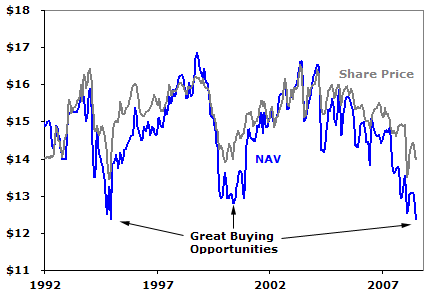If you understand the idea behind a mutual fund, then the leap to understanding the world's best "bank account" is easy...
A mutual fund simply pools money from individual investors and spreads the money among a number of investments. By owning a mutual fund, you benefit from diversified holdings, professional management, and easy record-keeping.
Most mutual funds are called "open-end" funds. This means the fund issues as many shares as investors are willing to buy. If an open-end fund suddenly has a thousand people wanting to invest in it, the managers simply issue more shares of the fund and buy a corresponding new amount of the stocks and bonds they like.
As a result, the price we pay for a share of an open-end mutual fund is simply the total dollar value of the securities divided by the current number of shares outstanding. The result is known as the "net asset value," or NAV. Open-end funds always trade at their NAV.
But there's a type of investment fund called a "closed-end fund" that works differently... and offers much bigger opportunities for us. These funds issue a limited number of shares, and this number doesn't change. They don't issue more shares if folks want to buy them. If you want to buy these shares, you must go to the stock market, where they trade just like any other stock. As a result, closed-end funds' market values fluctuate and do not necessarily reflect their NAV. The market often offers these assets for large premiums or discounts to their actual value.
This is where my favorite kind of "bank account" right now comes in...
Right now, closed-end funds that hold municipal bonds are trading at absurd discounts to their NAV. In other words, you can buy a collection of assets for much less than their actual worth.
State and local governments issue municipal bonds to raise money for public projects... like airports and sewage systems. To encourage investors to "invest with Uncle Sam," the government exempts the interest paid by "munis" from federal tax.
Because governments back them, muni bonds are considered very low risk. Investors don't demand high rates of interest from munis like they do from struggling manufacturing businesses. But since investors are scared of nearly every asset in the world right now, munis are going for ridiculously low prices.
It's giving us a great opportunity to buy bonds that pay us high tax-free rates of interest. The greatest opportunities here are in closed-end muni-bond funds that are trading for much less than their NAV. Right now, we can buy many municipal funds for as cheap as 86¢ for every dollar of assets.
Consider the last two times the markets did this. In 1994, you could buy $1 of muni bonds for 92¢. And in 2000, a dollar's worth of these bonds cost 85¢. The chart below of NIF (a Nuveen fund and a good proxy for the whole sector) shows these extremes – every time the blue line drops below the gray one, you could buy munis at a discount.
|
Munis Are Selling at a Huge Discount
|
 |
You can see that buying at a discount has led to years of share-price gains (not to mention the high yields).
The biggest complaint against munis is that state governments are in financial trouble. That's a worry... but if Washington is going to bail out individual companies like General Motors, you can bet that it'll bail out states and their financial obligations. Even when municipal bonds default, the recovery rate is excellent. Of the very few that have defaulted throughout history, investors got back nearly 70% of their money.
Many of these bond funds currently pay around 7.5% interest. Since the income is not taxed, it's like earning a taxable yield of 9.5%. The higher your tax bracket, the bigger the benefit.
These funds are diversified... they pay out steady interest... and they're going for big discounts to the assets they hold. They're a great place for your safe money. That's why I've nicknamed them the "best bank account in America." If you're looking for a safe place to park money, I encourage you to become familiar with "munis" immediately.
Here's to our health and wealth,
Dr. David Eifrig


